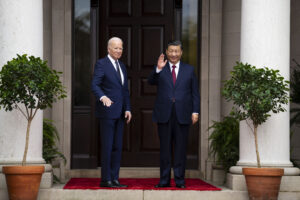Is a Global Recession Looming on the Horizon?
Economist Heiner Flassbeck argues that multiple factors point toward a cyclical downturn, and perhaps a larger financial crisis. Pixabay
Pixabay
What follows is a conversation between Economist Heiner Flassbeck and Paul Jay of the Real News Network. Read a transcript of their conversation below or watch the video at the bottom of the post.
PAUL JAY: If you listen to the business press, it won’t be long before we’re in recession, and perhaps globally something even more serious. That’s coming up next on The Real News Network.
[TRNN INTRO]
PAUL JAY: Well, as I said, if you listen to the gurus of finance that show up on Bloomberg Radio and other financial press and information, they are predicting a recession, perhaps before the end of 2019. And there is also lots of concern about the state of the global financial architecture, to use the kind of words they use in the financial and business press. One can see it in the stock market zooming up, and it doesn’t take a heck of a lot for it to zoom way down. There is tremendous volatility, and nobody quite knows what is coming next, I suppose, except if you’re in the know you can make a lot of money out of the volatility.
At any rate, now joining us to help make some sense of all this is Heiner Flassbeck. Heiner is director of Flassbeck Economics, a consultancy for global macro questions. Heiner is the former chief of macroeconomics and development of the United Nations Conference on Trade and Development. Thanks for joining us, Heiner.
HEINER FLASSBECK: Thanks for inviting me.
PAUL JAY: Where are you coming today? Where are you today?
HEINER FLASSBECK: In Geneva, close to Geneva and France.
PAUL JAY: OK. So talk about, first of all, why are so many, it seems, in the business consultancy, predictors, predicting a slowdown and recession, perhaps by the end of 2019? And it will be very interesting timing, because if there is a recession it within that time frame, then it could well come, you know, leading up into the 2020 elections in the United States.
HEINER FLASSBECK: Well, you see, we have a number of signals all around the world that show that a recovery may be over. We have to look at different regions for different reasons. But in the United States where there was a long recovery, unemployment is down. There was not the kind of investment we had expected, that everybody had expected. But nevertheless, it was a long recovery. And the Fed has done what it normally does in the recovery, it increased interest rates. Not very much, again, because we are in a very special situation. I’ll explain later. But nevertheless, this is the usual cyclical pattern that we see in the United States.
In Europe it’s a bit different. In Europe we had more or less no recovery, only a very, very brief recovery of 1.5 years or so. And there are signs of a recession even stronger in Europe. In Japan, also, there was quite a bit of a recovery. In China we had 30 years of a boom, and at a certain point is a boom is coming to an end. And all this may come together now and create, indeed, a very dangerous situation for the global economy.
PAUL JAY: Start with talking about China, because again I’m reading in the business press there’s been a lot of state lending to create this boom. There’s been a lot of infrastructure spending. And there’s talk now in China of kind of pulling back, and that even though things may slow down they may not continue the same kind of stimulus. They’re talking about the cost of borrowing that’s happening. What do you make of the Chinese situation?
HEINER FLASSBECK: Well, I think China is still absolutely able to pump money into the economy if it does need it. And I’m sure they would do it. Maybe they let the growth rate come down. We still talk about very high growth rates of 6, 7 percent. They may let it come down to 5 percent, 4 percent, but not much lower than this. The government has the means and the government has the ability to stimulate the economy, and that is exactly what they would do. So I’m not too much afraid about China. But as I said, it’s it’s a normalization at a certain point. They have, indeed, an enormous amount of construction, all kinds of construction. And at a certain point you always get into a kind of public situation where this is going to be stopped, or this is going to stop automatically, more or less.
PAUL JAY: So if China has the capacity to kind of avoid a more serious downturn, then the more trigger points in terms of recession, and that’s a little different than a financial crisis as we saw in ’07-’08, although they’re often linked, then the triggers for something deeper are what? Europe?
HEINER FLASSBECK: Europe is the biggest problem. You see, the United States were quite pragmatic. They had fiscal policy, extremely expansionary fiscal policy all the time. in Europe the situation is really really dangerous, because we had, as I said, no recovery. Unemployment is still very high in many countries. In France is 9 percent, in Italy it’s more than 10 percent. So we had no investment boom in Europe, not even in Germany, which was the country that is best off of all of them. And so for now it just remained zero, and we’re going into recession. So there is no possibility to stimulate the economy from the monetary side. And on the fiscal side, and this is the worst thing, on the fiscal side there is this enormous dogma in Europe that you should not use fiscal policy. Which is crazy, which is absolutely crazy.
PAUL JAY: Explain for a second for viewers who don’t follow these things what you mean by fiscal policy.
HEINER FLASSBECK: Fiscal policy is stimulating demand by government debt. By more government debt. In the United States we have seen Trump was more than active. The government debt, US government debt, is according to European terms exploding. You’re reaching 100 percent of GDP, which is not really a big problem. But given the dogma in Europe it it would be close to disaster. In Europe they would say with 100 percent of GDP you don’t get money from the market anymore. Which is ridiculous and wrong, but it is exactly what they say. And that is why Europe is stuck in its own dogma. And this dogma prevents it from doing reasonable things, and that is why this situation is getting worse.
Italy, which is a country which was in a recession for more or less ten years, is now going again down. I think that I would not call it a recovery. It was just a little, little upswing for a year or so. And now it’s going down again. And the government was elected to change the economy, but it was not allowed to change the economy because it was blocked by the European dogma not going for government debt.
So this is all extremely crazy, and it’s dangerous. It’s dangerous. It’s politically extremely dangerous, because what are people going to do? The left is joining this dogma of having no debt and having this kind of solid government finances. And so the people are voting more to the right. In Italy the next election, if it will come soon, it may come sooner than expected because the government may break, then they would vote 30, 35 percent for the Lega. Lega is a right-wing rather nationalist party, but they are pragmatic in terms of economic policy. So this is the crazy thing, the situation that we are facing.
PAUL JAY: And what–if there is a hard Brexit, meaning if the United Kingdom leaves Europe with no deal whatsoever, what does that do to an already fragile European economic situation?
HEINER FLASSBECK: Yeah, it could end up in a disaster if no one reacts immediately in terms of sort of, say, giving a safety net to these economies that the uncertainty is dramatically increasing. Nobody knows what happens to the trade relations with the United Kingdom. So that could really trigger a deep, deep recession. And as I said, given the situation Europe is in, it would be politically a plain disaster, a huge disaster. And that would have definitely negative spillover to all of the world.
PAUL JAY: So why is Europe playing such hardball with the UK in terms of the negotiations, and the dates, and all of this?
HEINER FLASSBECK: I mean, the Brexiteers in the UK where extremely naive. I mean, if you want to go out of a club, and you have some obligation to that club, you better ask the people before in the club, the other members, what they think about Brexit, and not go out or say “I want to go out” without talking about my my obligation that I still have, and the rules that they have to change. All this, they were extremely naive. I mean, this Johnson guy and this Farage, they were kids. They were ridiculously stupid people, and they put the UK in this situation.
PAUL JAY: Well, I guess their agenda was just a far-right political kind of takeover, and this was a means to that end.
HEINER FLASSBECK: But I’m not sure what they get in the end. I mean, the first round they disappeared. Both of them disappeared, more or less. And they may come up again if the whole thing is going to collapse and is a no-deal Brexit. But nobody knows.
PAUL JAY: If Europe does, within a year or so, sink into a deep depression, recession–I shouldn’t use the word depression–recession, what does that mean to North America and the rest of the global economy?
HEINER FLASSBECK: Well, it would be to the United States where that the situation is getting more difficult than it is. It is not, as I said, it’s not really so difficult in the United States, because there was a long recovery. It was not made by Mr. Trump. It came from Obama. But Trump did everything to keep it. And even if it is slowing down now, I’m sure they will not shy away from again pumping money into the economy. And that is the only thing you can do. Because you see, the global dimension shows that we’re in a very, very strange situation. We’re in a strange situation because monetary policy, as I said, is no longer available, more or less, in the world, even in the United States. Cutting interest rates by 1 percent will not change very much. You have no other means to stimulate the economy than fiscal policy. This is this the paradox construction that we have inherited from neoliberalism.
PAUL JAY: Again, meaning creating more money, which creates more government debt. Which in the United Sates they want to spend most of it–they seem to want to spend most of it on military production here.
HEINER FLASSBECK: Yeah, that is true. They could do reasonable things. The US infrastructure is clearly looking for investment, needs investment. So you could do very many reasonable things. But it is not, it is not happening. And this is our main problem, that we have given up all other ways, we have given up all the instruments that we have had available in the past. You see, this is the resul–and this is very important to understand–the result of neoliberalism. The paradox is neoliberalism, which is putting pressure on the wages of the average people all the time for 30 years, and with creating a deflationary situation by this has taken our monetary policy out of the game.
So with monetary policy out of the game, with wages depressed, you cannot stimulate this economy anymore. Only with fiscal policy, with pump priming, with deficit spending. Call it whatever you want.
PAUL JAY: There’s got to be some limit to how much of that you can do before people start to wonder what is the currency worth.
HEINER FLASSBECK: Look at Japan. There’s a long way to go for the United States. Japan is close to 300 percent GDP; the US are now at 100 percent. So there is quite a way to go. And there are no limits. Definitely there are no limits. You have this discussion about MMT in the United States, the Modern Monetary Theory. Their point is right. One point is absolutely valid. There are hardly no limits for government debt in our kind of economies. You can go a very, very long way to stimulate the economy, as I said. But there is nothing else available. Nothing else is available. This is what neoliberalism has created.
PAUL JAY: Now, in ’07-’08 there was a bubble burst, subprime. The amount of speculation going on and the banks were participating in was such that the banks didn’t trust other banks in terms of interbanking lending. And the–it was a financial system meltdown, not just something within the more cyclical, normal cyclical goals of the economy. What’s the danger of that? Because they’ve gotten rid of regulatory things like Dodd Frank in the United States almost completely. Wall Street is kind of speculating at will. How fragile is the whole architecture of the financial system?
HEINER FLASSBECK: It is not as fragile as ’07-’08, because we do not have that many bubbles, so to say, blowing up this time than it was at that time. We do not have a construction bubble in United States. We have one in China, but nowhere else, I think. We do not have that kind of commodity speculation that we had at that time. And we do not have so crazy, crazy speculation in currency all around the world. The only thing we have, we still have overvalued stock market, that’s for sure, in many countries of the world, including the United States. But this is not such a big danger for the economy, even if the stock market would collapse at a certain point in time, would go down 10,000 points, it would not be a disaster for the economy.
PAUL JAY: So in the immediate, meaning within the next year, year and a half, it’s not an ’07-’08 crash you’re seeing, but the possibility and even likelihood of a relatively deep recession is possible?
HEINER FLASSBECK: It depends on what policy does now. If policy is not reacting, say if in the United States Mr. Trump and the Republicans would come to the conviction that now government debt has reached the limit and you cannot do anything anymore, if in Europe they stick to their dogmatic position about fiscal policy, then everything can happen. That recession can become very deep. At the moment I do not see that, and you cannot forecast it. But the situation is fragile, because we’re still at the brink of a deflationary situation. So we could anyway, any time, slip into deflation again. We could anytime slip into, so to say, a depression of the expectations of the average people concerning their income, their future income, and that could deepen the whole thing. So vigilance on the side of policy is absolutely necessary, and the willingness to react immediately when the economy comes down.
PAUL JAY: All right. Thanks for joining us, Heiner.
HEINER FLASSBECK: You’re welcome.
PAUL JAY: And thank you for joining us on The Real News Network.
Your support matters…
Independent journalism is under threat and overshadowed by heavily funded mainstream media.
You can help level the playing field. Become a member.
Your tax-deductible contribution keeps us digging beneath the headlines to give you thought-provoking, investigative reporting and analysis that unearths what's really happening- without compromise.
Give today to support our courageous, independent journalists.






You need to be a supporter to comment.
There are currently no responses to this article.
Be the first to respond.